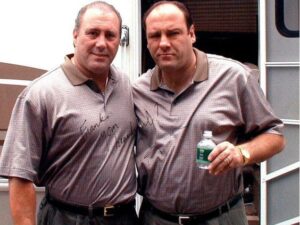
Introduction: Revisiting the Show That Redefined Television
When you think of iconic TV shows that have left an indelible mark on popular culture, The Sopranos is almost always at the top of the list. It’s no exaggeration to call it the godfather of prestige TV, a term that has come to define the golden era of high-quality television. The show’s influence continues to resonate with audiences, critics, and creators alike, solidifying its place as one of the greatest TV series of all time.
In this article, we’ll dive into why The Sopranos was so groundbreaking, explore its lasting impact on the television landscape, and examine how it forever changed the way we view not just mobsters, but storytelling in general.

The Sopranos: A Game-Changer in TV History
What is Prestige TV?
Before we dive into the specifics of The Sopranos’ influence, let’s quickly address the term prestige TV. This label refers to a wave of high-quality television shows that emerged in the late 1990s and early 2000s, often characterized by complex characters, multi-layered narratives, and a focus on high production values. Think of shows like The Wire, Mad Men, and Breaking Bad.
However, The Sopranos was the first show to truly embody this concept. It wasn’t just about a gripping story or high-stakes drama—it was about a shift in what audiences expected from television. For the first time, TV was being taken as seriously as film, and The Sopranos led that charge.
Tony Soprano: The Antihero Who Changed TV Characters Forever
The Rise of the Antihero
At the center of The Sopranos was Tony Soprano, a mob boss struggling with personal and professional issues. Played by the incomparable James Gandolfini, Tony was both a villain and a sympathetic character, a complex man grappling with his own morality, mental health, and family.

Tony was the epitome of the antihero, a character who defies traditional heroic norms but is still compelling enough for audiences to root for. He wasn’t a clear-cut “good guy,” but his vulnerabilities made him relatable, giving rise to a new era of morally ambiguous protagonists in television.
The Genius of James Gandolfini’s Performance
One of the reasons The Sopranos remains so impactful today is because of James Gandolfini’s masterful performance as Tony Soprano. Gandolfini brought a raw authenticity to the role, balancing Tony’s brute force with moments of introspection and vulnerability. His portrayal elevated the character from a mere mob boss to one of the most unforgettable figures in TV history.
Without Gandolfini’s brilliance, it’s likely that The Sopranos wouldn’t have had the same cultural significance. His ability to embody Tony’s complicated nature was key to the show’s success and has since become a model for future antiheroes in TV shows.
Breaking Boundaries: How The Sopranos Changed TV Storytelling
A New Kind of Narrative Structure
Prior to The Sopranos, many television shows adhered to a more traditional episodic format. The Sopranos changed that by introducing a more serialized style of storytelling. The show’s long-term arcs, with intricate character development and plot progression, allowed viewers to dive deeper into the lives of its characters. It was a far cry from the straightforward, episodic dramas that dominated TV before.
By focusing on interpersonal drama, psychological depth, and morality, The Sopranos created a complex, evolving narrative that demanded the viewer’s full attention. Each episode built on the last, creating a rich, immersive experience that was rarely seen on TV at the time.
The Show’s Bold Exploration of Mental Health
One of the most groundbreaking aspects of The Sopranos was its portrayal of mental health. Tony Soprano’s struggles with anxiety and depression were central to the show, as he sought therapy with Dr. Jennifer Melfi (played by Lorraine Bracco). The depiction of therapy, mental illness, and the complexities of seeking help was both ahead of its time and deeply humanizing.
In many ways, the show opened up important conversations about mental health, showing that even someone as tough as a mob boss could be vulnerable. It was a stark contrast to the stereotypical portrayal of mobsters as emotionless, ruthless figures, and it made the audience rethink what it meant to be “tough.”
The Sopranos’ Cultural Impact: TV as High Art
The Show’s Influence on Modern TV
The Sopranos wasn’t just a revolutionary show in terms of storytelling—it also set the stage for a whole new era in television. Shows like Mad Men, Breaking Bad, True Detective, and The Wire owe a huge debt to The Sopranos for proving that TV could be just as, if not more, impactful than film.
By elevating the medium and attracting critics, scholars, and cinematic directors, The Sopranos helped establish TV as a legitimate form of high art. The show was no longer just for casual entertainment; it was something to be analyzed, studied, and discussed in academic circles.
Redefining TV Villains and Antiheroes
The success of Tony Soprano opened the door for other complex, morally grey characters to emerge on TV. Shows like Walter White from Breaking Bad and Don Draper from Mad Men followed in Tony’s footsteps, embodying the antihero archetype in their own ways. Without The Sopranos, it’s unlikely that the antihero trend in television would have reached its current prominence.
The Sopranos’ End: A Pioneering Conclusion
The Controversial Final Scene
No discussion of The Sopranos is complete without mentioning its infamous final scene. The show ended in 2007 with a cliffhanger that left fans debating whether Tony Soprano was killed in the final moments or if life simply went on. This open-ended conclusion was groundbreaking in its ambiguity and added to the show’s legacy as a culturally significant work.
Unlike many shows that opted for clear resolutions, The Sopranos invited viewers to interpret the ending for themselves, making it one of the most talked-about conclusions in television history.
The Lasting Legacy of The Sopranos
A Benchmark for TV Excellence
Today, The Sopranos continues to be a benchmark for TV excellence, inspiring countless filmmakers, writers, and actors. Its influence can be seen in everything from the quality of writing to the depth of characters to the way TV shows are structured. In many ways, it laid the foundation for the high standards we now expect from television.
Why We Still Talk About The Sopranos
The fact that The Sopranos still sparks conversation, even years after it ended, speaks to its enduring relevance. Its characters, themes, and storylines continue to resonate with audiences old and new, cementing its place in pop culture.
Conclusion: The Sopranos’ Impact Is Unmatched
Looking back at The Sopranos, it’s clear that the show was more than just a television series—it was a cultural phenomenon that reshaped the TV landscape. With its groundbreaking narrative, complex characters, and exploration of morality and mental health, it became the gold standard for what prestige TV could be.
By breaking down barriers and challenging traditional notions of what TV could be, The Sopranos carved out a legacy that still influences modern television today. It truly deserves the title of the godfather of prestige TV, and its impact will be felt for years to come.
FAQs
- Why is The Sopranos considered the godfather of prestige TV?
- The Sopranos is often credited with pioneering the era of high-quality, complex television. It raised the standard for storytelling, character development, and production values.
- How did Tony Soprano change TV characters?
- Tony’s portrayal as an antihero, with complex moral dilemmas, influenced a wave of morally ambiguous protagonists in modern TV.
- What was groundbreaking about The Sopranos’ approach to mental health?
- The show normalized conversations about mental health, especially with Tony Soprano’s therapy sessions, offering a fresh perspective on mental illness in popular media.
- How did The Sopranos influence other TV shows?
- The Sopranos set the stage for future TV dramas by proving that television could be as sophisticated and artistically valuable as film.
-
What does the ending of The Sopranos mean?
- The final scene of The Sopranos was left intentionally ambiguous, sparking debate about whether Tony Soprano was killed or if